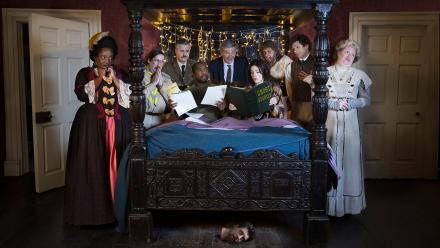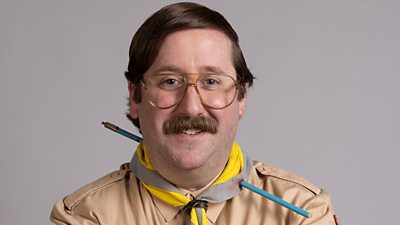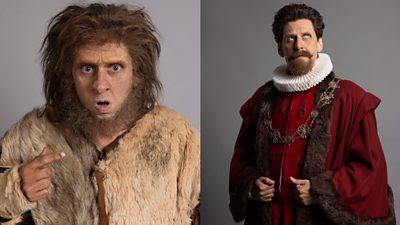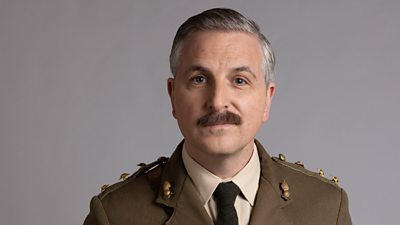
Jim Howick (Pat)

Pat (Jim Howick)
Why do you think you six work so well together as a group?
I just think there's a general understanding between us. There's a trust and a faith, and we still make each other laugh outside of working hours. We get a kick out of making each other laugh, and there’s still a real joy to that. We are our first audience. What works in the room often goes on to the page, and more often than not stays on the page, and so the jokes and the laughs really are from us as a group. There's a genuine love as well – there is a love affair between us. It’s also probably healthy that we take a bit of time off and concentrate on other things from time to time. We've all got individual jobs and things going on. It's nice to honour those and to take a breather, but I'm sure we'll be very excited to be back in the room together at some point.
Why does Ghosts connect with audiences in so many different countries?
I think it's simply that audiences enjoy watching a gang of people with differing opinions. Viewers can relate to that. Everyone has a family or a friendship group that they perhaps squabble with from time to time. I think the Ghosts represent that. They all have differing values and principles, and so they can learn from one another. It’s a model that works because it's essentially a family unit. Also, different countries can buy into their own history or their own culture.
What do you think people’s response will be to the final episode?
I think there’ll be some sadness about the show ending and we're pleased about that, to be honest, because I'd much rather that than people turning off already, pleased that it's over. I think that is a good sign that people will be sad. I just hope that people think the show has been fulfilling.
Tell us the thinking behind ending it now then.
We all agreed that with anything that goes beyond five series, there's a real danger that it might outstay its welcome. We wanted to be ahead of the curve as far as any kind of waning is concerned. That would show. Not many sitcoms can survive more than five series at a particular level. When you get into a writers’ room, I think it's very obvious when ideas start to thin out or you start to recycle old stories with new characters. We haven't done any of that. Every single story is original.
Have fans of the show begged you to change your minds?
Yes. So many people have said to us that we should keep going and that there's so much more to find out about these characters. But the truth is, it's very hard to bring that into play when you've got nothing that can affect the practical stakes. You're dealing with seven supernatural characters that can't be late for anything. They're not in any relationship. They can't be fired at all. None of the usual sitcom stakes apply to this show. So, you're dealing with emotional stakes more than anything else. It’s not that tricky to come up with an idea for a ghost – Pat’s got the hump because of this. But finding practical resolution to these stories is hard. And so we decided as a group that it's probably best to quit while we're ahead, to go out on a high and to varnish the legacy that we've created. In many ways, it feels like total madness and a very silly decision indeed. But I think it's right for us as a group. It’s good for our stock as a creative engine. It’s the right thing to do.
The fans of Ghosts are passionate about the show. Have you seen any striking examples of that?
Yes. I've seen people with tattoos of Pat. It’s quite overwhelming to see yourself inscribed onto someone's flesh. We've come up with this character, and he is quite like me. And there's someone who's committed him to their body forever, unless they go off the show massively and get some sort of laser treatment. That would be a strong reaction to the last episode - to have that tattoo of Pat lasered off in protest. That would be the final irony.
Laurence Rickard (Robin/Humphrey)

Robin the Caveman / Humphrey’s Head (Laurence Rickard)
Why do you think Ghosts has been so popular?
I think there's a slight sense in the tone of what we always do. Mat puts this really well; there's a feeling that we're pulling down our beards, winking at people and going, “Look, it’s us!” You get a sense of the amount of fun that we're having doing it. That always comes across.
It’s quite difficult sometimes to get high-concept comedies away. This was a pitch for an idea, we were like, “This sounds a bit ridiculous, but there are going to be two lead characters and only one of them can see the ghosts.” Even though it's quite an unusual setup, it's got that classic sitcom shape of really different people who are unable to escape each other. That’s distilled down in Ghosts. I think people really responded to that.
Why else are viewers drawn to this show?
I think there's a warmth in all the characters, even the characters where we didn't expect to find any. Obviously, from day one everyone loved Pat because he’s the nicest ever human being. But as the series went on, audiences found real humanity in the Captain and Lady Button. The warmth towards them grew and grew.
What is the secret to the relationship between you six writer-performers?
We’re all very un-alike as people. Six more un-alike people you couldn’t hope to find. But we all get on really well. We've all got a very similar sense of humour. That’s always been the case from early in Horrible Histories. When we were in a green room together or sitting at a table at lunchtime, we'd all be laughing. When you have any job where you have a nice working environment and fun colleagues, you go, “Oh, I’ll stay here.” Really early on, we realised that Horrible Histories couldn’t go on forever and that we should try to do something else together. We have been really lucky. We've been able to do three different series and a film together. We’ve done something together every year for 15 years. And the hope is to go on and do something else together now.
How do you find the business of putting on Robin’s makeup?
Actually, I quite enjoy the process. I have a two-hour call for makeup and Martha has an hour-and-a-half call. So, we are makeup buddies. Just as we're finishing, the others turn up and comb their moustaches and put some wax in their hair. There’s something nice in always trying to perfect it all and finding little, tiny tweaks and improvements. At the start it took almost three and a half hours, but by the end we had we got it down to just under two hours. So, we refined the process. The makeup people are just phenomenal. They are always there before I am and they're still there when I leave – and my day’s long enough!
The show is able to address some quite serious subjects, isn’t it?
Yes. It’s an interesting way of dealing with our country’s history – even sometimes the difficult bits of history. Through the series, there's been a little bit about what it is to be British and colonialism and same-sex marriage. You get to lightly touch deeper issues as well because it's disguised amongst a lot of silliness. It’s like a Trojan horse.
Were you all overcome with emotion shooting the final scenes of Ghosts?
Oh, my goodness. I think throughout the final week, we all had tiny breakdowns. Obviously, we'd known it was coming for a long while. In the process of writing series four, we started to talk about maybe just doing one more so we had a long run into it. But yes, I think we were all taken by surprise by how emotional it was. The last scene we shot was the last scene of the series so it really tugged on the heartstrings. There were a lot of tears, but it was happy and sad. It was sad to say goodbye to something which has been so much fun. But at the same time, it's just been such an incredible thing to have done. Going into it, none of us had any idea that it would go on to become what it has.
What do you hope that people are saying to each other at the end of the series?
In the nicest possible way, I hope they're going, “No! Why have they finished it?” because that’s what we keep saying – “Why have we done this?” I hope they feel that it's a rewarding tying up. We tried not to do what's expected. We wanted it to finish in a way that felt satisfying for the viewer, but also for the Ghosts, too. We wanted viewers to feel that all’s well with the characters, and we didn't want to do it in a trite way. We didn't want to do the obvious. We always get people pitching to us – “You know what you should do?” The number of people who've gone, “Mike should see the Ghosts, too.” You think you want that. It sounds fun, but what that actually does is fundamentally change the shape of the show and probably kill it. We tried to make a satisfying finale, but not do the expected.
Have you bumped into a lot of the show’s very devoted fans?
Yes. I met someone the other day who was showing me the tattoo on the back of her calf of Humphrey’s head. I was like, “Wow!” Then she went, “Look at the other leg” and pulled her trousers up on the other leg to reveal Humphrey’s headless body. That was amazing. But also, I thought, “Oh my God, what have you done?” Recently, we went to the London Comic Con, and hundreds of people there were all dressed up as the ghosts. In television, obviously, you very rarely get to meet your audience so it was really lovely to see just how much people had taken this show to their hearts.
Ben Willbond (The Captain)

The Captain (Ben Willbond)
Do you think that audiences have softened towards the Captain over the years?
Absolutely. I've always written characters where I try create as much empathy as possible. That's the key to writing drama or comedy. The audience have to feel they know these people. Over the years, it just felt natural to do more of that. I don’t think of the comedy first, I think of the character first. You allow them to show their vulnerability and their humanity. If you’re watching something like Succession, at first you think, “I don’t like any of these people.” But you actually start to empathise with them because they are human. You empathise with their heartbreak and their humanity. Even though their attitude is very far away from yours, you're still drawn in on a human level. That’s very important in storytelling.
Can you tell us more?
That is why the audience have that perception of getting to know a character better every week because you’re stripping away layers each time. That particularly applies to the Captain because the more the audience have got to know him over the course of five seasons, the more they have softened towards him. The first question when you’re setting out on a BBC comedy is, “Is this funny?” And then, as the story progresses, you go into the characters’ lives, peel back layers and reveal their personalities. I've always felt it's very funny to watch very buttoned-up people. You think, “You were a child once, and there’s still a child in there, someone who wants to be loved.” That creates a beautiful comic tension.
Why do you think Ghosts has done so well all over the world?
Because it feels like a family. I was watching some of the early episodes of Modern Family recently, and the way they constructed them was so brilliant. Every character has a story, whether it’s emotional or practical. In the really good episodes, they're both practical and emotional. You get this bonding feeling, and it's multigenerational - I think Ghosts has the same effect.
Can you think of other examples from sitcom history?
I always go back to Captain Mainwaring from Dad’s Army. He is always trying to keep up this buttoned-up facade of “I’m a bank manager and I’m your Captain and I’m in charge, so will you all just behave?” He’s got absolutely no authority whatsoever, but he is actually this very gentle human being underneath. And of course, another captain.
How did you all respond at the end of the shoot of this final series?
Tears were shed. When we started shooting the last series, we thought, “Oh, we have got loads of time”, but of course filming goes in the blink of an eye. There’s nothing you can do about it. You come to the end and you think, “Oh no, have we done the right thing?”
Have you?
Yes. It was time. We all had a mutual agreement and understanding that if we carried on much longer, it would have just started to drift and we would have begun to lose the tightness in the stories. It is at those moments that you go, “We should have ended when we were on top”. So, it's the right decision.
But it was still tough?
Yes, it was really hard because the prospect is that you might not have this ever again; this might be it. And that's fine. But it's quite a lot to deal with in the moment.
Can you amplify that?
It was hugely difficult. It took me a long time to recover. I was all over the place for a couple of months. Ghosts had been seven years in the making. We started to get together to pitch it, and suddenly we were on a roll, and then you blink and it’s over. I remember saying during the first season, “If we get five series, I'll be 50 by then.” And I had my 50th birthday on set during the last series. I just had that moment where I thought, “Oh my God, it’s actually happened!”
Do a lot of people come up to you and say how much they love the series, then?
Very much so. People will expand on that; they won’t just tell you a story. That's when you know that you've connected. For instance, after the episode where Mary got sucked off in the last series, we had a lot of letters from people, which was really moving. They said, “I lost someone this year, and I loved your episode.” To have given people comfort and made them feel like they’re not alone was amazing. The episode was touching on grief and loss. So, to have those people come and tell you that was really special. And then suddenly you think, “Well, hang on. We are supposed to be writing a comedy here!” I'm absolutely cool with that. For me, that is almost more important. Because one thing it told me is how you connect with the audience and how you tell the story. Once you've tasted that, you don't want to let that magic go because that's what storytelling is – it’s connecting properly with an audience.
That must be so gratifying.
Definitely. To have co-created something which people respond to in that way is just such a reward. It's everything. You think, “That's it. That's job done.” It’s an endless source of happiness.
All pictures/interviews: BBC/Monumental Pictures/Guido Mandozzi
Pages
- « first
- ‹ previous
- 1
- 2
- 3



